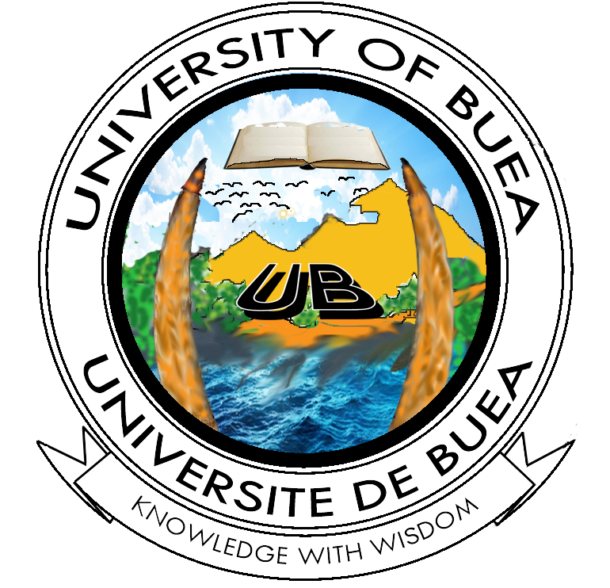Duration: 2 years
Fee Paying: No
Admission Requirements
A bachelor’s degree in Physics; Engineering; or mathematics with a minor in physics. The required degree classification should be at least a second class honours (lower division) or equivalent.
Objectives
The University of Buea was founded not only to provide instruction at University level in English but also to be a motor of development at both local and national levels. The master's degree programme in physics therefore seeks to further the above objectives by the provision of courses that would reinforce the notions taught at undergraduate level. The programme would also seek to provide specific advanced courses, which would prepare our graduates to do research in appropriate areas. Such research would be aimed not only at advancing science but primarily at providing specific solutions to problems that are tributary to our present level of development or that would improve conditions of living in both urban and rural areas of our country The duration of this programme will be two years as stipulated by texts governing such programmes in the Universities of Cameroon. Courses of the first semester would seek to reinforce notions seen at undergraduate level and to broaden the scope of basic training provided at that level. The number of such courses would be 05 with a total credit value of30. The courses of the second semester would be more specific, and their total credit value would also be30. Some of these courses are elective so that students can get advanced training in an applicable area of Physics. The credit value of the thesis which would normally be research work done in the second year, will be thirty (30). The number of elective courses of the second semester of the first year would be determined by material and human resources. During this semester also, the student is expected to choose his or her research topic. He or she is expected to relate the courses of this semester to the research topic and to start doing a literature search. The final part of the M.Sc. programme would be devoted primarily to research. It is however expected that students would participate in seminars and lectures that seek to explore and broaden aspects of science which are related to their areas of research and which would show how much progress they are making. In view of the role computing plays in research in the physical sciences, students who would not have completed courses equivalent to our PHY423 would be encouraged to take and pass the course. Students would therefore be expected to master and to be able to use at least one appropriate computing language and one word processing software.
Employment Opportunities
Holders of postgraduate degrees in Physics are in high demand in many domains of teaching and research. For those who do the energy option job prospects also exist in rural electrification and agriculture (food processing). Those who do the geophysics option will also have a lot of prospects in oil and mining companies, as well as in the domain of water supply (underground water). Those who do other options in the degree programme could be used in industry (for people of applied physics and electronics and communications) and in any specialised laboratory.
Courses
Elective Courses
PHYMScElectiveCourses
- PHY602: Wind Turbine Aerodynamics
- PHY603: Continuum Dynamics
- PHY604: Dosimetry and Radiation Biophysics
- PHY606: Potential Field Theory
- PHY607: SemiconductorPHYsics
- PHY608: Seismic Methods
- PHY609: Group Theory and Symmetry inPHYsics
- PHY612: Medical Imaging
- PHY615: Quantum Field Theory and Feynman Path Integrals
- PHY616: Electrical Communication Fundamentals
- PHY617: Physics of Brian and Nerve
- PHY619: Introduction to Many-Body Theory
- PHY620: Spin Glasses and Neural Networks
- PHY622: Physical Instrumentations
- PHY624: Spectroscopic and measurement techniques
- PHY625: Wireless Transmission Techniques
- PHY627: Monte Carlo Methods in StatisticalPHYsics
- PHY628: Waves: zoonoses and animal models
- PHY632: Atomic and MolecularPHYsics for MedicalPHYsics
- PHY635: Signal Processing and Data Analysis
- PHY636: Medical Electronics
- PHY637: Solar Electricity
- PHY638: Thermo-fluid Mechanics
- PHY641: Photonics
- PHY643: Electrical Methods
- PHY644: Condensed Matter
- PHY646: ParticlePHYsics
- PHY648: Design of Digital Integrated Circuits
- PHY651: Differential Geometry forPHYsics
- PHY653: Physics for Diagnostic Radiology
- PHY654: Phase Transitions and Critical Phenomena
- PHY659: Transmission Line Theory
- PHY660: Advanced Materials
- PHY661: AdvancedPHYsics for Cameroon Milieu
- PHY662: Material Science
- PHY663: Quantum Statistical Mechanics of Complex Systems
- PHY664: Advanced ComputationalPHYsics
- PHY666: Non-linear Dynamics and Chaos
Other Elective Courses
StatPHYMScElectiveCourses
- PHY615: Quantum Field Theory and Feynman Path Integrals
- PHY619: Introduction to Many-Body Theory
- PHY620: Spin Glasses and Neural Networks
- PHY627: Monte Carlo Methods in StatisticalPHYsics
- PHY628: Waves: zoonoses and animal models
- PHY654: Phase Transitions and Critical Phenomena
- PHY663: Quantum Statistical Mechanics of Complex Systems
- PHY664: Advanced ComputationalPHYsics
TheorPHYMScElectiveCourses
- PHY603: Continuum Dynamics
- PHY606: Potential Field Theory
- PHY609: Group Theory and Symmetry inPHYsics
- PHY615: Quantum Field Theory and Feynman Path Integrals
- PHY628: Waves: zoonoses and animal models
- PHY644: Condensed Matter
- PHY646: ParticlePHYsics
- PHY651: Differential Geometry forPHYsics
- PHY664: Advanced ComputationalPHYsics
AdvMatNonLinPHYMScElectiveCourses
AppPHYMScElectiveCourses
- PHY603: Continuum Dynamics
- PHY606: Potential Field Theory
- PHY607: SemiconductorPHYsics
- PHY622: Physical Instrumentations
- PHY624: Spectroscopic and measurement techniques
- PHY628: Waves: zoonoses and animal models
- PHY641: Photonics
- PHY660: Advanced Materials
- PHY661: AdvancedPHYsics for Cameroon Milieu
- PHY662: Material Science
- PHY664: Advanced ComputationalPHYsics
ElecCommPHYMScElectiveCourses
- PHY616: Electrical Communication Fundamentals
- PHY622: Physical Instrumentations
- PHY625: Wireless Transmission Techniques
- PHY635: Signal Processing and Data Analysis
- PHY648: Design of Digital Integrated Circuits
- PHY659: Transmission Line Theory
- PHY664: Advanced ComputationalPHYsics
- PHY666: Non-linear Dynamics and Chaos
MedPHYMScElectiveCourses
- PHY604: Dosimetry and Radiation Biophysics
- PHY612: Medical Imaging
- PHY617: Physics of Brian and Nerve
- PHY632: Atomic and MolecularPHYsics for MedicalPHYsics
- PHY635: Signal Processing and Data Analysis
- PHY636: Medical Electronics
- PHY653: Physics for Diagnostic Radiology
- PHY664: Advanced ComputationalPHYsics


